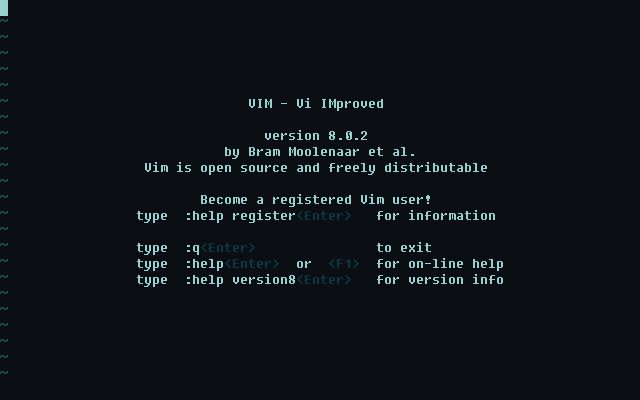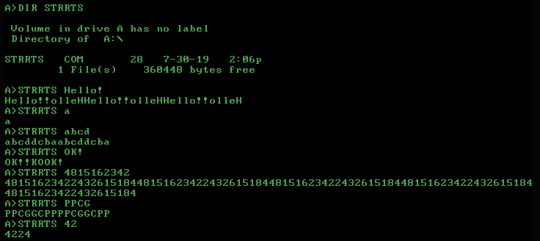44
6
Here is a relatively simple challenge for you.
Given a string of length N, output the string forwards, then backwards, then forwards, then backwards... etc. N times. For example, if your input was
Hello!
You should output:
Hello!!olleHHello!!olleHHello!!olleH
You may also optionally output one trailing newline.
Your submission may be either a full program or a function, and you may take input and output in any reasonable format. For example, you may take IO from STDIN/STDOUT, function arguments and return value, from a file, etc. You can safely assume that the input string will not be empty, and will only contain printable ASCII. You must output the new string on a single line. So, for example, if the output to the last example was
Hello!
!olleH
Hello!
!olleH
Hello!
!olleH
This would not be a valid solution!
Here are some more test cases:
Input:
a
Output:
a
Input:
abcd
Output:
abcddcbaabcddcba
Input:
OK!
Output:
OK!!KOOK!
Input:
4815162342
Output:
4815162342243261518448151623422432615184481516234224326151844815162342243261518448151623422432615184
Input:
PPCG
Output:
PPCGGCPPPPCGGCPP
Input:
42
Output:
4224
Leaderboards
Since this is a code-golf challenge, standard loopholes are banned, and the shortest answer in bytes wins! However, this is also a competition to have the shortest answer in any particular langauge. While it's unlikely that a Java answer will beat an answer in perl, or some golfing language, it's still very impressive to have the shortest Java answer. So, you can use this leaderboard to see both
The shortest answer out of all languages, and
The shortest answer in each individual language.
To make sure that your answer shows up, please start your answer with a headline, using the following Markdown template:
# Language Name, N bytes
where N is the size of your submission. If you improve your score, you can keep old scores in the headline, by striking them through. For instance:
# Ruby, <s>104</s> <s>101</s> 96 bytes
If there you want to include multiple numbers in your header (e.g. because your score is the sum of two files or you want to list interpreter flag penalties separately), make sure that the actual score is the last number in the header:
# Perl, 43 + 2 (-p flag) = 45 bytes
You can also make the language name a link which will then show up in the leaderboard snippet:
# [><>](http://esolangs.org/wiki/Fish), 121 bytes
var QUESTION_ID=93261,OVERRIDE_USER=31716;function answersUrl(e){return"https://api.stackexchange.com/2.2/questions/"+QUESTION_ID+"/answers?page="+e+"&pagesize=100&order=desc&sort=creation&site=codegolf&filter="+ANSWER_FILTER}function commentUrl(e,s){return"https://api.stackexchange.com/2.2/answers/"+s.join(";")+"/comments?page="+e+"&pagesize=100&order=desc&sort=creation&site=codegolf&filter="+COMMENT_FILTER}function getAnswers(){jQuery.ajax({url:answersUrl(answer_page++),method:"get",dataType:"jsonp",crossDomain:!0,success:function(e){answers.push.apply(answers,e.items),answers_hash=[],answer_ids=[],e.items.forEach(function(e){e.comments=[];var s=+e.share_link.match(/\d+/);answer_ids.push(s),answers_hash[s]=e}),e.has_more||(more_answers=!1),comment_page=1,getComments()}})}function getComments(){jQuery.ajax({url:commentUrl(comment_page++,answer_ids),method:"get",dataType:"jsonp",crossDomain:!0,success:function(e){e.items.forEach(function(e){e.owner.user_id===OVERRIDE_USER&&answers_hash[e.post_id].comments.push(e)}),e.has_more?getComments():more_answers?getAnswers():process()}})}function getAuthorName(e){return e.owner.display_name}function process(){var e=[];answers.forEach(function(s){var r=s.body;s.comments.forEach(function(e){OVERRIDE_REG.test(e.body)&&(r="<h1>"+e.body.replace(OVERRIDE_REG,"")+"</h1>")});var a=r.match(SCORE_REG);a&&e.push({user:getAuthorName(s),size:+a[2],language:a[1],link:s.share_link})}),e.sort(function(e,s){var r=e.size,a=s.size;return r-a});var s={},r=1,a=null,n=1;e.forEach(function(e){e.size!=a&&(n=r),a=e.size,++r;var t=jQuery("#answer-template").html();t=t.replace("{{PLACE}}",n+".").replace("{{NAME}}",e.user).replace("{{LANGUAGE}}",e.language).replace("{{SIZE}}",e.size).replace("{{LINK}}",e.link),t=jQuery(t),jQuery("#answers").append(t);var o=e.language;/<a/.test(o)&&(o=jQuery(o).text()),s[o]=s[o]||{lang:e.language,user:e.user,size:e.size,link:e.link}});var t=[];for(var o in s)s.hasOwnProperty(o)&&t.push(s[o]);t.sort(function(e,s){return e.lang>s.lang?1:e.lang<s.lang?-1:0});for(var c=0;c<t.length;++c){var i=jQuery("#language-template").html(),o=t[c];i=i.replace("{{LANGUAGE}}",o.lang).replace("{{NAME}}",o.user).replace("{{SIZE}}",o.size).replace("{{LINK}}",o.link),i=jQuery(i),jQuery("#languages").append(i)}}var ANSWER_FILTER="!t)IWYnsLAZle2tQ3KqrVveCRJfxcRLe",COMMENT_FILTER="!)Q2B_A2kjfAiU78X(md6BoYk",answers=[],answers_hash,answer_ids,answer_page=1,more_answers=!0,comment_page;getAnswers();var SCORE_REG=/<h\d>\s*([^\n,]*[^\s,]),.*?(\d+)(?=[^\n\d<>]*(?:<(?:s>[^\n<>]*<\/s>|[^\n<>]+>)[^\n\d<>]*)*<\/h\d>)/,OVERRIDE_REG=/^Override\s*header:\s*/i;body{text-align:left!important}#answer-list,#language-list{padding:10px;width:290px;float:left}table thead{font-weight:700}table td{padding:5px}<script src="https://ajax.googleapis.com/ajax/libs/jquery/2.1.1/jquery.min.js"></script> <link rel="stylesheet" type="text/css" href="//cdn.sstatic.net/codegolf/all.css?v=83c949450c8b"> <div id="answer-list"> <h2>Leaderboard</h2> <table class="answer-list"> <thead> <tr><td></td><td>Author</td><td>Language</td><td>Size</td></tr></thead> <tbody id="answers"> </tbody> </table> </div><div id="language-list"> <h2>Winners by Language</h2> <table class="language-list"> <thead> <tr><td>Language</td><td>User</td><td>Score</td></tr></thead> <tbody id="languages"> </tbody> </table> </div><table style="display: none"> <tbody id="answer-template"> <tr><td>{{PLACE}}</td><td>{{NAME}}</td><td>{{LANGUAGE}}</td><td>{{SIZE}}</td><td><a href="{{LINK}}">Link</a></td></tr></tbody> </table> <table style="display: none"> <tbody id="language-template"> <tr><td>{{LANGUAGE}}</td><td>{{NAME}}</td><td>{{SIZE}}</td><td><a href="{{LINK}}">Link</a></td></tr></tbody> </table>

In your example, shouldn't that be
olleH, notelloH? – Arnaud – 2016-09-15T03:27:51.250@SuperChafouin Haha, you're right. I've fixed that now. – James – 2016-09-15T03:31:13.500
@DJMcMayhem can we take the input reversed? Or output the reversed letters in the oppsite order? e.g.
!olleHHello!kinda thing – Downgoat – 2016-09-15T03:52:05.4372@Downgoat No, you must take input and output in the same format as the spec describes. – James – 2016-09-15T04:15:25.630
4Shouldn't the title be StringgnirtSStringgnirtSStringgnirtS? – Luis Mendo – 2016-09-15T08:39:49.293
What if the input has a newline? "\nHello!\n\n" – Magic Octopus Urn – 2016-09-15T12:29:39.177
2@carusocomputing It won't: "You can safely assume that the input string will not be empty, and will only contain printable ASCII." – Martin Ender – 2016-09-15T13:50:47.267
1https://en.wikipedia.org/wiki/ASCII#Printable_characters Ah, didn't know that was a well defined subset of ASCII. I imagined printable to include \t, \n, etc... – Magic Octopus Urn – 2016-09-15T14:59:52.430
LOL'ing at
OK!!KOOK!– dkudriavtsev – 2016-09-16T23:47:57.767